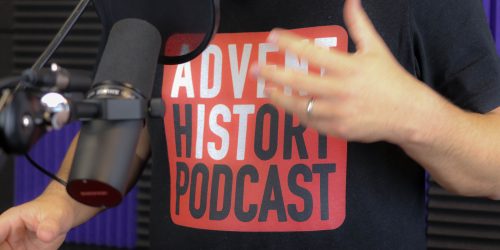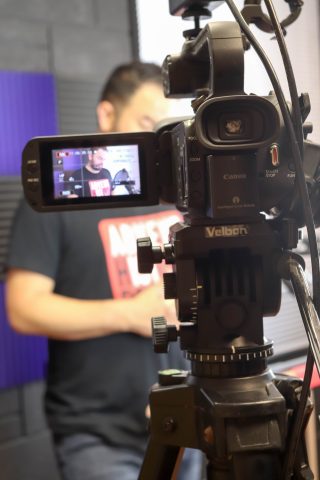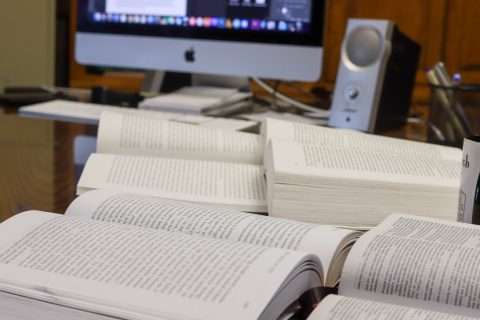

First, a “Do Not Disturb” sign is taped to the door, the audio levels are tweaked on a small, laptop-sized sound board, the blinds are closed, then the lights go out.
“I’m an introvert,” admits Lucio. “I needed an introvert outlet. It’s just me and the mic,” he explains. For the next hour or so, Lucio’s face is lit only by the glow from the screen of his computer monitor where his most recent 15-20 hour research and writing is displayed.
If you’re not familiar with podcasting, you could be in the minority. Think radio talk show meets newscast on the internet. Put simply, a podcast is an audio or video program file available online at your convenience and downloadable to most any electronic device. Lucio, and others like him who have been podcasting for years, have recently noticed a significant uptake in both podcast creators and their listeners.
Consider Lucio’s stats alone. When he started in 2014 (October 22nd, by the way), he had 12 downloads, meaning potentially 12 unique individuals or groups for that specific podcast. It eventually grew to 33,000, then 80,000. In just the last few months it’s catapulted to more than 154,000 downloads – anything but a great disappointment!
“That’s insane!” exclaims Lucio. “We are pioneering here!”
Victor Muzica, now living in Oregon, was one of Lucio’s early listeners. He and his wife came to the U.S. from the Eastern European country of Moldova and quickly immersed themselves in the English language.
“We were hungry to discover new information and learn new things. That is how we ended up in the world of podcasts,” says the self-described millennial. At the time, Muzica admits he was surprised there weren’t more Adventists using this internet medium. “The only Adventist podcasts (that they had found) were the sermons from Pioneer Memorial Church, but, boy, Dr. Nelson is talking so fast,” he says through a smile.
Muzica finally came across Lucio’s Adventist History Podcast (AHP), and he was hooked. “Here I found that the true history is not about perfect people doing perfect things, but is about a perfect God working through people (like me). I see this theme crossing all the episodes, and this is more real, more like the Bible, and it is really encouraging,” Muzica explains.
Muzica was so inspired, in fact, that he and a team of translators, editors, voiceover artists, designers and programmers started their own podcast, translating Lucio’s AHP into Russian. Take a listen at adventisthistory.info.
Many faith-based podcasters admit part of the excitement of podcasting is never knowing who you’re going to reach or how the Holy Spirit may use the material. In Lucio’s case, it even served as a “business card” for his next pastoral move (Lucio has served as a pastor for nine years). One of the church elders in Lucio’s current district had been listening to AHP for a while and enjoyed it so much that he got his three kids (ages 11 to 14) to tune in regularly. When the Peoria Church had an opening for a pastor, Matthew Rice mentioned Lucio’s name to conference leadership. Rice confesses he wasn’t even sure if the podcaster was a pastor. All he knew was Lucio was engaging and could hold people’s attention. “Jesus taught in parables and stories. That’s just much more impactful,” says Rice.
History itself has made an impact on Lucio, especially in his role as a pastor. Podcasting about the past was a way for him to sort it all out and stay true to the convictions God had placed on his heart. “I found a lot of controversies (in our church) are rooted in Adventist history — like women’s ordination and communion. I especially need to know and understand that history. I need to be accountable to that knowledge,” says Lucio.
That drive to answer a call or fill a void resonates with many millennial podcasters (or younger), says Ryan Becker. Becker, a podcaster himself, is a founding member of the recently formed group, Podcasters of Adventism. He admits that, in just the past year, the number of Adventist-based podcasts have spiked. The independent ministries of these podcasters dive deep into everything from social justice and church politics to Adventist theology, church culture and, of course, Adventist history.
So, why now? Why the explosion? Becker thinks there are a few reasons. It has become more mainstream in secular news and media; it’s affordable; you don’t necessarily need a special skill to start; and people have simply recognized an opportunity.
“I know many young adults have felt like their voices aren't heard in institutional Adventism. Podcasting gives its hosts permission to be unfiltered, authentic and heard. It was the perfect outlet for a generation that is feeling like that isn't the case in their home churches, schools or religious environments,” says Becker.
Lucio began his Adventist History Podcast with William Miller. Now, 54 episodes later, he’s just delved into 1919, the year of one of our famous Bible conferences. Each episode is intimate. “I visualize I’m explaining [our history] to someone in the room with me,” says Lucio. “He/she is young, an Adventist, knows Ellen White (but not much), and is a little irreverent. Basically, I picture myself,” he laughs. And that signature dry wit, laid back style, yet rich, factual detail is weaved into every episode.
“There’s a difference between being serious and taking your truth seriously. Adventist history is a serious thing, but it doesn’t have to be told in a serious way,” insists Lucio.
Telling our Adventist stories — our struggles, our hopes, our frustrations and celebrations — in a different way is, perhaps, the point. At least, a fast-growing audience thinks so.
